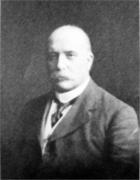|
|
||||||||||||||||||||||||
 |
Featured person
Recently added |
Thomas Brown (1879 - 1944): |
||||||||||||||||||||||
Thomas Watters Brown was a prominent legal figure before and after the foundation of Northern Ireland, occupying a number of the most prominent offices.
The second son of James A Brown, merchant, of Newtownards, Co Down, and Mary Anne Watters, Thomas Brown (always known as Tom) was educated at Campbell College, Belfast and Queen’s College, Belfast, taking his BA from the Royal University of Ireland in 1904. He then taught in a number of secondary schools before deciding to become a barrister.
He was called to the Irish Bar in 1907 and joined the North East Circuit in the same year. A tall, strongly-built man, Brown’s commanding personality and eloquent advocacy meant that he soon built up a considerable reputation, notably with his success in securing the acquittal of a defendant charged with murder after three juries disagreed. He acquired a large practice and became a KC (King’s Counsel) in February 1918 on the same day as Anthony Babington, Edward Murphy and James Andrews, each of whom was senior to him and who were destined to be judicial colleagues.
In the General Election of December 1918 Brown was returned as the Unionist MP for North Down, holding the seat until his appointment as a High Court Judge in February 1922. When DM Wilson KC resigned as Solicitor General for Ireland upon being appointed Recorder of Belfast in June 1921, Brown succeeded him as Solicitor General, and when Denis Henry KC resigned in August upon his appointment as the first Lord Chief Justice of Northern Ireland, Brown was appointed Attorney General for Ireland and sworn of the Irish Privy Council, holding that post until December 1921 when he resigned due to his disagreement with the British government over its policy towards Northern Ireland. Brown therefore had the melancholy distinction of being the last Solicitor General and then the last Attorney General for Ireland.
In February 1922 Brown was appointed a judge of the new High Court in Northern Ireland and was assigned to the King’s Bench Division. Despite being a former law officer who could have hoped for promotion to the Court of Appeal, Brown was handicapped in that regard by his rapid progress at the Bar, because by the time of his appointment to the High Court he had not been in practice for the necessary fifteen years required for appointment to the Court of Appeal. As a judge Brown was regarded as tempering justice with mercy. He was prone to urge settlement in the cases before him, thereby enabling him to rise early and return to his beloved Donaghadee and the golf course there. He also served as Chairman of the Northern Ireland Arbitration Tribunal which dealt with wage and labour disputes.
Outside the Law, as well as being a keen golfer Brown was prominent in the affairs of the Presbyterian Church. He served for many years as Chairman of Convocation of Queen’s University, Belfast, and was a member of the board of Regent House School, Newtownards.
He married Mary Hadden; they had one daughter and two sons, one of whom died on military service during the Second World War, the other, Captain James A Brown, who followed his father to the Bar, becoming a county court judge and then Recorder of Belfast.
| Born: | 17 March 1879 |
| Died: | 7 October 1944 |
| AR Hart |
| Bibliography: Kenneth Ferguson (ed.): King’s Inns Barristers 1868-2004; AR Hart: A history of the Bar and Inn of Court of Northern Ireland; Sir Edward Jones: Jones LJ his life and times; WWW; ILT&SJ, lxxviii (194), 262; The Newtownards Chronicle 14 October, 1944 |


Home | Our Policies | Plaques | Browse | Search | Sponsors | Links | Help | Contact
Privacy & Disclaimer | Cookie Policy | Site Map | Website Design By K-Point
© 2024 Ulster History Circle









